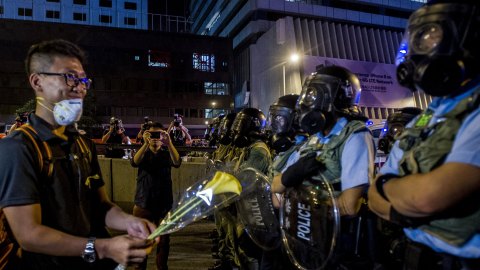China’s Radical Plan to Gamify Social Control

The Chinese government recently began trialing what is probably the largest social experiment of all time. The scheme known as China’s Social Credit System (SCS), links up credit data held by banks with data from social media, online purchases (Sesame Credit) and government data such as traffic violations. The resulting credit score can be used to reward citizens who are well behaved in the eyes of the state. The rewards could be anything from faster Internet speeds and a higher level of service from private companies to a lower level of bureaucracy when dealing with government agencies.
Last week the following video went viral after it described the dystopian possibilities enabled by the scheme, that is due to become mandatory for all Chinese citizens in 2020. “Mass censorship, jail time, assassinations — those are all big, messy implements for keeping a population in line. That messiness and severity fosters resentment, eventually rebellion. They are expensive, they are unwieldy; in the end those tools are impossible to maintain, but social pressure, ostracisation… those things are free; they happen on their own, and as a government tool, they don’t have nearly the same potential for going embarrassingly and disastrously wrong.” The filmmaker points out that techniques that take advantage of behavioural psychology will likely be far more effective than old-fashioned tools of oppression.
For their part, in a statement to New Scientist, Ant Financial the company that operates Sesame Credit has denied that material posted on social media would affect Sesame Credit scores. It remains unclear however whether the Chinese government is prepared to offer the same assurances for the broader social credit system. At this point, it seems quite reasonable to worry that there may be some substance behind the claims. Firstly, if social media posts and social media relationships aren’t factored into social credit scores, then the question must be raised as to how and why social data is being used in the first place. Secondly, the Chinese government has a terrible record for manipulating discussion on social media with a vast army of paid Internet commenters dubbed the “50-cent-party” who praise the government line while burying dissent. With growing evidence of the Chinese government’s efforts to control online discourse by stifling dissent, it seems reasonable to assume that the social credit system at the very least has huge potential for becoming an incredibly powerful device for social control.
Follow Simon Oxenham @Neurobonkers on Twitter, Facebook, RSS or join the mailing list.
Image Credit: XAUME OLLEROS / Stringer. A demonstrator offers a flower to riot policemen during a pro-democracy protest in Hong Kong on September 28, 2014. Police fired tear gas as tens of thousands of pro-democracy demonstrators brought parts of central Hong Kong to a standstill.





